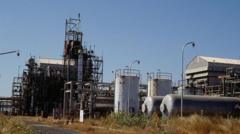The removal of hazardous waste from the abandoned Union Carbide factory in Bhopal, India, has begun, marking a significant milestone after 40 years since the catastrophic gas leak that claimed thousands of lives. The Madhya Pradesh state High Court had set a strict four-week deadline for the cleanup, which led to the transportation of approximately 337 tonnes of toxic materials to a specialized incinerator facility located about 230 kilometers away.
The toxic remnants include pesticide residue and "forever chemicals," notorious for their enduring toxicity, which had been leaking into the environment, posing serious health risks to local residents. Authorities initiated the removal process on Sunday, utilizing leak-proof containment bags and transporting them in sealed trucks accompanied by police and emergency services.
Despite the careful measures taken for the waste disposal, local activists express concerns about the potential negative impact of incineration, recalling previous incidents where similar attempts resulted in soil contamination. However, officials maintain that the current plan ensures no hazardous effects will reach nearby communities.
The Bhopal gas tragedy is deemed one of the largest industrial catastrophes globally, with official estimates of a death toll reaching around 15,000, though activists argue it could be much higher. As the cleanup continues, the call for justice remains unfulfilled with only minor penalties imposed on key company figures in past court rulings. The now-defunct Union Carbide, once an American corporation, was acquired by Dow Chemicals in 1999.
The toxic remnants include pesticide residue and "forever chemicals," notorious for their enduring toxicity, which had been leaking into the environment, posing serious health risks to local residents. Authorities initiated the removal process on Sunday, utilizing leak-proof containment bags and transporting them in sealed trucks accompanied by police and emergency services.
Despite the careful measures taken for the waste disposal, local activists express concerns about the potential negative impact of incineration, recalling previous incidents where similar attempts resulted in soil contamination. However, officials maintain that the current plan ensures no hazardous effects will reach nearby communities.
The Bhopal gas tragedy is deemed one of the largest industrial catastrophes globally, with official estimates of a death toll reaching around 15,000, though activists argue it could be much higher. As the cleanup continues, the call for justice remains unfulfilled with only minor penalties imposed on key company figures in past court rulings. The now-defunct Union Carbide, once an American corporation, was acquired by Dow Chemicals in 1999.





















